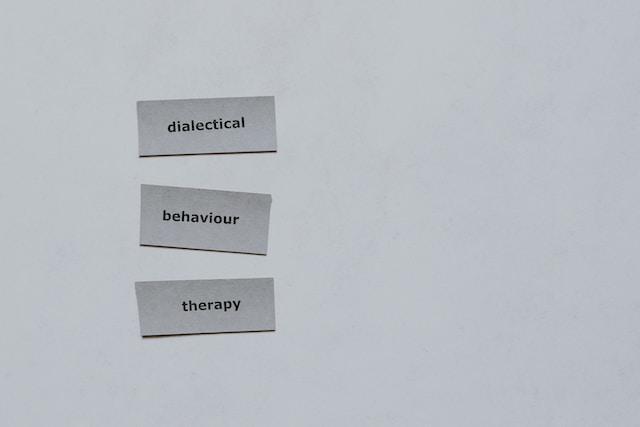Navigating Emotional Health: Dive into DBT London's Approach
Navigating Emotional Health: Dive into DBT London's Approach
Blog Article
Nurturing Emotional Durability and Self-Awareness With Dialectical Behaviour Therapy (Dbt) Providers: Your Journey to Inner Peace
In the quest of emotional durability and self-awareness, the use of Dialectical Behaviour Treatment (DBT) solutions supplies a structured technique that incorporates various basic concepts to cultivate internal tranquility. Understanding the core tenets of DBT supplies a solid foundation for individuals looking for to navigate their psychological landscape with better quality and control.
Comprehending DBT Fundamentals
A comprehensive comprehension of Dialectical Habits Treatment (DBT) principles is vital for understanding its concepts and application in emotional durability. DBT is a restorative strategy developed by Marsha M. Linehan to help individuals fighting with emotional dysregulation, commonly related to conditions like borderline personality disorder. The core concepts of DBT focus on four primary components: mindfulness, distress resistance, emotion policy, and interpersonal performance. Mindfulness is the structure of DBT, emphasizing present moment awareness without judgment. Distress tolerance skills equip individuals to sustain and make it through dilemmas without making spontaneous decisions (DBT London). Feeling law methods aid individuals identify and handle extreme emotions effectively. Interpersonal effectiveness skills instruct individuals just how to assert their requirements while preserving relationships. By understanding these fundamental facets of DBT, individuals can cultivate psychological resilience by discovering to manage their feelings, browse connections, and deal with traumatic situations better. This foundational knowledge establishes the phase for the effective application of DBT principles in promoting mental well-being and internal peace.
Creating Psychological Guideline Skills
One secret facet of creating emotional guideline abilities is learning to identify and label different feelings precisely. This self-awareness enables individuals to determine the root causes of their feelings and respond properly (DBT London). Furthermore, practicing mindfulness methods can help individuals stay existing in the moment and stop overwhelming feelings from hijacking their ideas and actions
Additionally, implementing healthy coping approaches, such as deep breathing workouts, dynamic muscular tissue relaxation, or basing methods, can offer individuals with effective devices to control their feelings throughout times of distress. By constantly exercising these abilities, people can develop a solid structure for psychological strength and self-awareness, inevitably cultivating inner tranquility and wellness.
Enhancing Interpersonal Performance


With a solid foundation in psychological law skills, people can currently concentrate on refining their social performance to navigate social interactions with greater convenience and success. Interpersonal efficiency, a critical part of Dialectical Behavior Therapy (DBT), gears up people with the necessary tools to communicate assertively, set boundaries, and develop healthier partnerships. By learning to reveal opinions and demands plainly while respecting the viewpoints of others, people can cultivate a lot more additional resources meaningful connections and reduce disputes in their communications.
DBT emphasizes the value of effective interaction, teaching individuals how to actively pay attention, verify others' feelings, and assert their own demands without being aggressive or passive. This ability allows individuals to navigate difficult conversations with confidence and compassion, fostering understanding and participation in their partnerships. By establishing abilities to manage interpersonal disputes constructively, people can maintain much healthier limits, advocate for themselves, and work out concessions when differences develop.
Inevitably, boosting social efficiency with DBT encourages people to browse different social contexts with empathy, durability, and credibility, cultivating more fulfilling and unified connections in their lives.
Practicing Mindfulness Techniques

One essential mindfulness strategy made use of in DBT is the "wise mind" principle, which encourages people to integrate their emotional and reasonable minds to make balanced decisions. This practice enables individuals to navigate psychological triggers with a calmer and a lot more logical approach, lowering spontaneous responses. In addition, mindfulness techniques help in basing people in the here and now minute, steering them far from rumination on past events or anxiety regarding the future.
Structure Distress Tolerance Approaches
To boost emotional strength in individuals undertaking Dialectical Practices Treatment (DBT), it is vital to concentrate on building reliable distress resistance strategies. Developing these techniques is essential for individuals to navigate through difficult situations without ending up being overwhelmed (DBT London). Distress tolerance skills help individuals stand up to and Resources cope with intense feelings, situations, or situations where they may be tempted to participate in harmful habits
One trick distress resistance strategy often taught in DBT is the ACCEPTS acronym, which represents Activities, Contributing, Contrasts, directory Emotions, Pushing away, Ideas, and Sensations. These skills give people with a tool kit of methods to distract themselves from stressful feelings or scenarios in a healthy manner.
In addition, learning just how to self-soothe with tasks like deep breathing workouts, taking a cozy bathroom, or taking part in leisure activities can additionally assist build distress tolerance. By including these strategies into daily technique, people can better handle stress, manage feelings, and ultimately cultivate a higher feeling of emotional strength.
Verdict
In final thought, the journey in the direction of inner tranquility through Dialectical Behaviour Therapy (DBT) includes understanding its basics, developing emotional policy abilities, enhancing social efficiency, exercising mindfulness strategies, and building distress resistance approaches. By using these techniques, people can support psychological resilience and self-awareness, bring about a better feeling of inner peace and well-being. Incorporating DBT services into one's life can provide useful tools and resources for taking care of emotions and partnerships properly.
Comprehending the core tenets of DBT offers a strong foundation for individuals looking for to browse their emotional landscape with greater clearness and control. By comprehending these essential elements of DBT, people can cultivate psychological durability by learning to handle their emotions, browse relationships, and cope with stressful circumstances much more efficiently.Mindfulness techniques play an essential duty in improving emotional regulation and promoting self-awareness in individuals undergoing Dialectical Practices Treatment (DBT)One basic mindfulness method utilized in DBT is the "wise mind" idea, which urges individuals to incorporate their emotional and reasonable minds to make balanced choices.To enhance psychological durability in people going through Dialectical Behaviour Therapy (DBT), it is crucial to focus on building reliable distress resistance methods.
Report this page